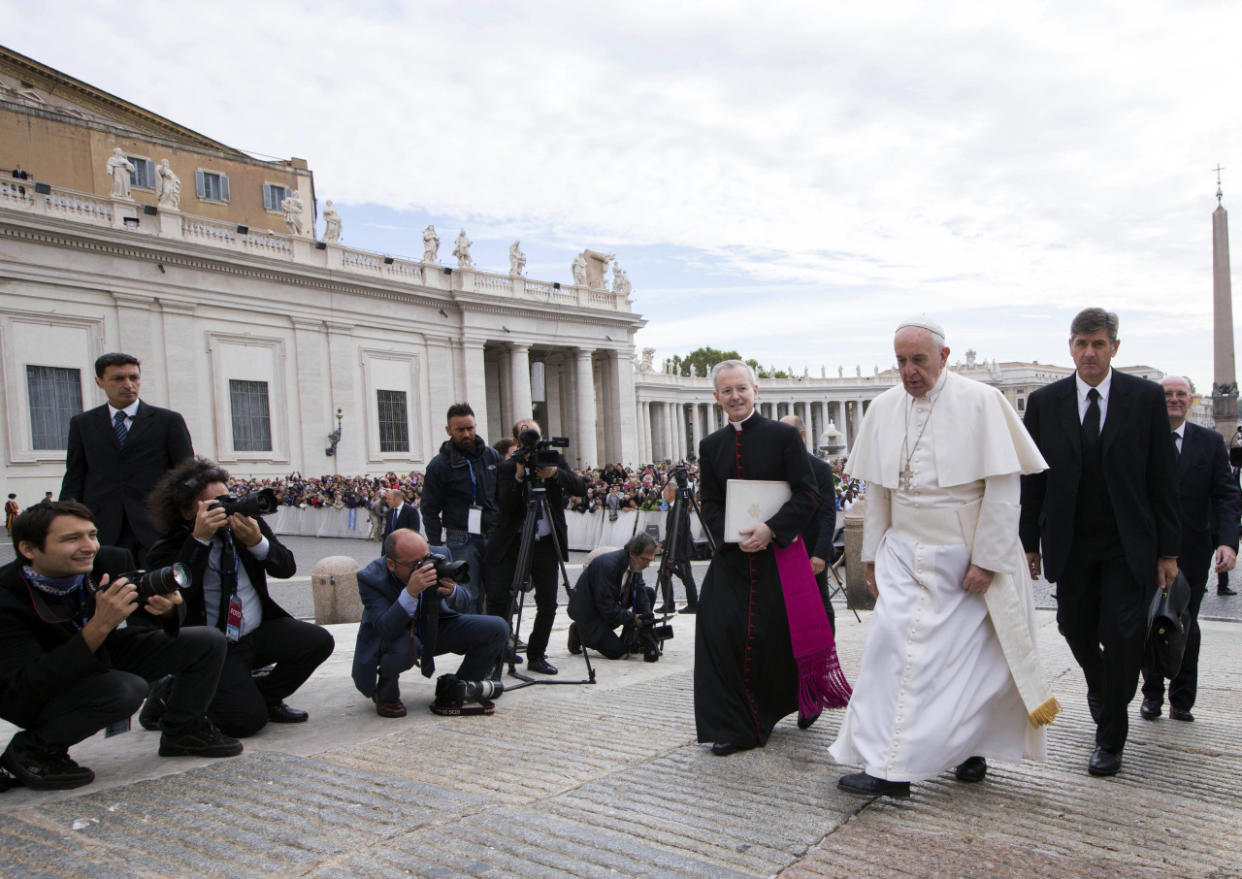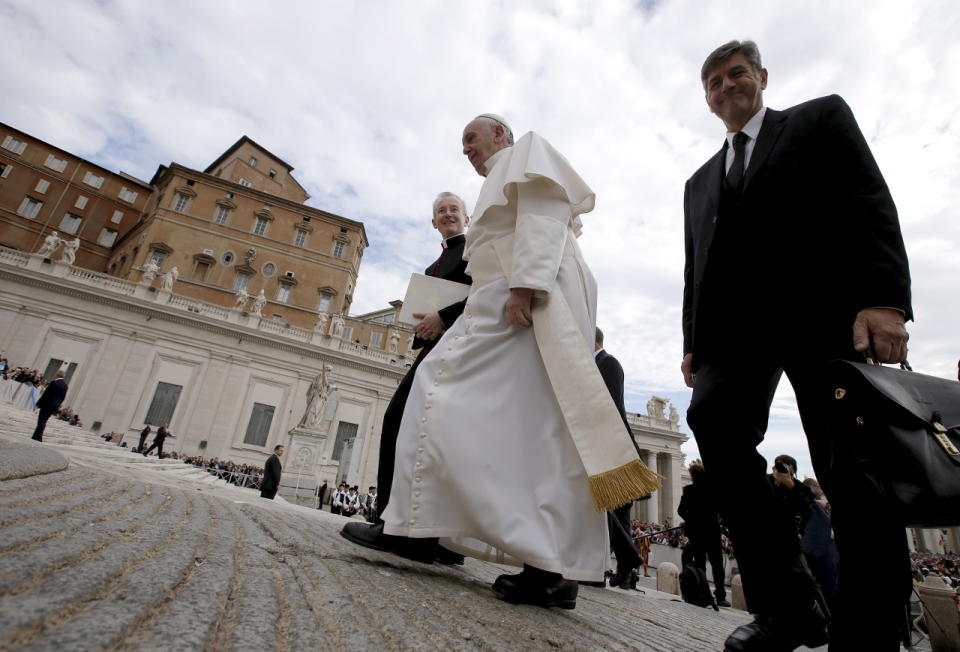Archbishop orders priests to deny Communion to dissenters. Is Francis’ message lost?

(Photo: AP/Riccardo De Luca)
Only weeks after Pope Francis spent his visit to the United States calling for a culture of dialogue on contentious issues, some American prelates are back to business as usual.
In a memo sent to priests in his archdiocese this week, Archbishop John Myers of Newark issued strict guidelines for denying Communion to Catholics whose marriages are not recognized as valid by the church, and prohibiting the sacrament to those who support same-sex civil marriage. Parishes and other Catholic institutions, the archbishop decreed, should never host individuals or organizations that disagree with church teachings.
This is precisely the kind of fortress Catholicism — a church hunkered down behind imposing walls — that Pope Francis vigorously rejects.
Instead, the pope wants a church that acts like a “field hospital after battle.“ He insists that Communion is not “a prize for the perfect but powerful medicine and nourishment for the weak.” While the New Jersey archbishop sends a message that he is putting Catholic institutions on lockdown, Pope Francis recently welcomed Democratic U.S. mayors, including Bill de Blasio of New York City, and the pro-choice secular feminist Naomi Klein, to the Vatican for climate change talks. No one was carded at the door.
Before addressing Congress, Pope Francis warmly greeted Secretary of State John Kerry. The pro-choice Catholic became a lightening rod during the 2004 presidential campaign when a handful of conservative bishops publicly argued he should not receive Communion. In the wake of the pope’s visit, Vatican officials squashed efforts from Kim Davis and her lawyers to use the pope as a pawn in the culture wars. And when news broke that Pope Francis had held one private meeting in Washington, D.C., it turned out to be with a longtime friend from Argentina who has been in a same-sex relationship for nearly two decades.
A ‘Francis Effect’ in the U.S.?
Pope Francis left U.S. Catholics with plenty to think about and act on after his first whirlwind visit to this country. This refreshing and complicated papacy presents unique challenges and opportunities for the American church. The pope’s desire to find a “new balance” that recalibrates the Catholic conversation beyond the flash points of a few hot-button issues — along with his muscular focus on the root causes of structural injustice — should shake up the politics of the church and our values debates in American politics.
But any real “Francis effect” will depend on whether religious leaders, elected officials and those of us in the pews wake up to the pope’s bracing call for radical change.
A pope who describes economic inequality as the “root of social evil,” insists on the moral urgency to address climate change and wants a “poor church for the poor” is clear and consistent in his messages. Don’t underestimate this smiling reformer exuding gentleness and joy. The captain of this ancient and sometimes leaky ship known as the Catholic Church is charting a definitive course.
At the White House welcome ceremony on his first full day in town, Pope Francis smiled at the pageantry in his honor but wasted little time before challenging complacency.
“Mr. President, I find it encouraging that you are proposing an initiative for reducing air pollution,” he said. “Accepting the urgency, it seems clear to me also that climate change is a problem which can no longer be left to a future generation. When it comes to the care of our ‘common home,’ we are living at a critical moment of history.” Powerful American politicians, knee deep in oil- industry contributions, were not called out by name, of course, but plenty of conservative Catholics on Capitol Hill and Republican Catholics campaigning for the presidency don’t share the pope’s sense of urgency or even believe that human behavior contributes to the problem. The status quo is comfortable. It rewards the privileged. Francis knows the poor and most vulnerable already suffering from the impact of environmental degradation don’t have the luxury of indifference.
Pope Francis also offered a timely antidote to the resurgent nativism and xenophobia on the American right. Donald Trump rose in the polls by calling Mexican immigrants “rapists.” He stokes fear and resentment, the demagogue’s weapons of choice for centuries. In contrast, Francis introduced himself as “the son of immigrants” and reminded us of our American experience. “We, the people of this continent, are not fearful of foreigners, because most of us were once foreigners,” he said during the first papal address to Congress in history.
Many watching were moved by these poignant remarks, including presidential candidate Marco Rubio, a Catholic, who cameras caught wiping away tears. But with his eyes fixed on winning the GOP presidential nomination, the Florida senator who once teamed up with Democrats to press for systematic changes in immigration policy now largely serves up red meat to satisfy a conservative base that views anything less than tough talk about border security as unacceptable. The House of Representatives, made up of 137 Catholics, refused to even vote on a bipartisan comprehensive reform bill passed by the Senate. Will these Catholics continue to cheer Pope Francis as a moral leader, but fail to act on an earned path to citizenship for the estimated 11 million undocumented immigrants toiling in the shadows?
In a city where super-PACs, lobbyists and pundits often treat politics as a horse race, Pope Francis lifted up a more noble vision. “You are called to defend and preserve the dignity of your fellow citizens in the tireless and demanding pursuit of the common good, for this is the chief aim of all politics,” he reminded members of an institution paralyzed by partisanship and divided by ideological turf wars.
While some religious leaders and lawmakers reduce the defense of human life to opposing abortion, Pope Francis underscored the church’s consistent ethic of life tradition when he reiterated his call to end the death penalty. Just two weeks after his address, five states were scheduled to execute six death row inmates, and despite the pope’s personal efforts to intervene in the case of Georgia death row inmate Kelly Gissendaner, she was executed on Sept. 30. The U.S. remains one of the few developed nations in the world where the death penalty is viewed as morally tolerable. Pope Francis has an uphill battle to convince even his own flock. Half of all Catholics in the U.S support the death penalty.

(Photo: Reuters/Max Rossi)
Francis’ family values
Pope Francis’ official reason for making his first trip to the United States was to attend the World Meeting of Families, a massive gathering founded by Pope John Paul II and held in a different city every three years. In Philadelphia, the pope surprised no one by clearly affirming church teaching on marriage as exclusively between a man and a woman. At the same time, he addressed issues of family and religious liberty in a much broader context than some U.S. religious and political conservatives, who often fixate on fighting gay marriage. In one of the few times that the pope discarded his prepared text, he spoke about the family as “a factory of hope” but was clear-eyed about the stresses on families struggling to balance the demands of work and children.
“In families we quarrel,” the pope said. “Sometimes plates can fly. Children bring headaches. …Children bring their challenges and they are also the cause of work and worry. Sometimes I see some of my helpers, my workers at the Vatican, and they come to work, and they look tired. They have a 1-month-old baby, and they look tired. I think of all those parents, all those families who lack employment or workers rights, and how this is a true cross. How many sacrifices they make to earn their daily bread.”
The pope is a pastor and doesn’t travel the world with a portfolio filled with policy solutions. This doesn’t mean he simply wants abstract or theological discussions. “A good Catholic meddles in politics,” the pope has remarked, and he insists that reality and people are more important than ideas. By lifting up the economic stresses facing families, the pope should prompt a sober reflection in this country about why the wealthiest nation in the world has a woeful track record when it comes to family policies that most advanced nations take for granted.
Opportunity for U.S. religious leaders
Pope Francis offers the best opportunity in a generation for U.S. religious leaders to reclaim a more effective voice in the public square. At a time when one in 10 Americans are former Catholics — and one-third of Americans under the age of 30 no longer identity with any religious denomination — the pope presents a different face of Christianity that seems to be turning heads. Whether he can help repair the damage done by the religious right in this country remains to be seen. As Robert Putnam of Harvard University and David Campbell of the University of Notre Dame documented in their book, Amazing Grace: How Religion Unites and Divides Us, the perception that conservative religious and political forces owned the values debate in America turned off many progressive and moderate Christians in the 1990s and 2000s, who in many cases severed their ties with institutional religion.
Pope John Paul II and Pope Benedict XVI had more than three decades to shape the leadership of the church in the United States with their appointments and priorities. At 78, Francis is unlikely to have such a lengthy tenure. But he seems to be a man on a mission. It’s clear the pope wants a different model of religious leadership. He recognizes that the best form of evangelizing is to engage and persuade, to build a welcoming church of open doors.
“Harsh and divisive language does not fit the tongue of a pastor, it has no place in his heart,” the pope told 300 U.S. bishops at a prayer service in downtown Washington during his trip. “Although it may momentarily seem to win the day, only the enduring allure of goodness and love remain truly convincing.” One wonders if Bishop Daniel Jenky in Illinois, who has referred to President Obama in the same breath as Hitler and Stalin, or Bishop Morlino in Wisconsin, who says he wants “the Lord to stir up the gifts of the Holy Spirit to fight the culture wars” will hear that message or hunker down even more.
American Catholics should avoid the temptation to view the church as a spectator sport. Pope Francis has a big megaphone and his actions matter. But what all of us do in response to the pope’s calls for action may ultimately matter even more than what he says and does.
John Gehring is Catholic program director at Faith in Public Life, an advocacy group in Washington. He is the author of The Francis Effect: A Radical Pope’s Challenge to the American Catholic Church.

